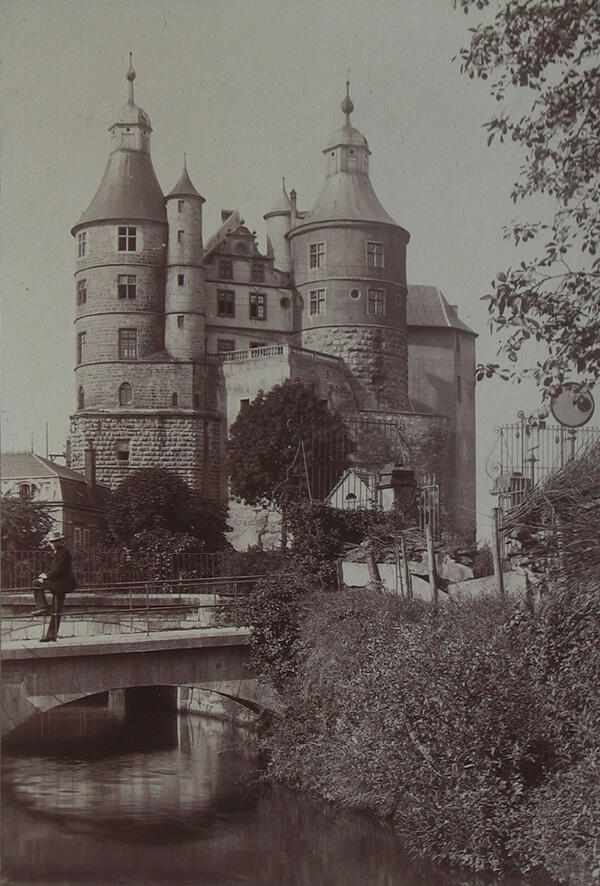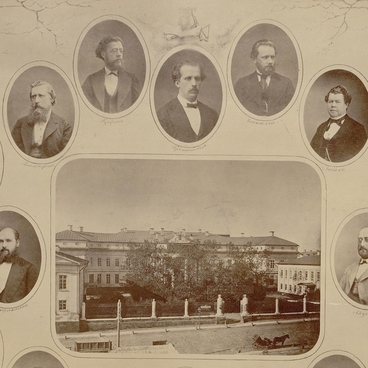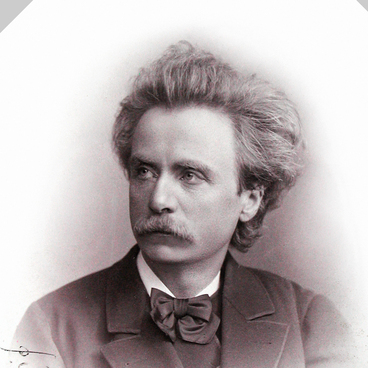Russian composer Pyotr Tchaikovsky came to the city of Montbéliard in northwestern France in December 1892, when he was visiting his former governess FannY Dürbach. It is likely that Tchaikovsky purchased this photograph of the castle of the Dukes of Württemberg during a walk with Fanny along the streets of Montbéliard; the Dürbach family was in their good graces. In addition to this picture, he also brought an entire album with city views from his trip to France.
Fanny Dürbach spent a total of four years with the Tchaikovsky family, but she left an indelible impression on every family member. It is clear from their loving recollections of her. In his diaries, Pyotr Tchaikovsky described their Saturday nights as follows: there were no classes, so Fanny Dürbach and the older children spent the long and dark winter evenings sitting in a room lit by just one lamp and telling different stories in turn. Fanny had to talk more than others — about the king of France and legend characters. Fanny had a good teaching experience, knew a lot about different subjects, and was very well-educated. The composer’s mother, Alexandra Tchaikovskaya, believed it was the governess who planted the seeds of hard work, diligence and decency in her children. Unfortunately, Fanny did not stay in the Tchaikovsky’s house for long — in 1848, the family moved to Moscow. The older boys were sent to a boarding school, and the younger ones needed a nanny more than a governess. Fanny accepted a lucrative offer from a family of landowners — the Neratovs, and parted with her friends forever.
But the children and the governess missed each other greatly. Some time later, they started a correspondence. All members of the Tchaikovsky family were writing to Fanny Dürbach. Even the youngest children would add a few words to the letters of their elders. However, despite the mutual love, the correspondence still stopped over time. When Fanny Dürbach came back to her native Montbéliard, she did not hope to see the family again, and she was very excited to receive a letter from Pyotr Tchaikovsky in 1892. This led to a correspondence, and then a face-to-face meeting in December of the same year. A meeting with the former governess made an indelible impression on Tchaikovsky. Researchers believe it is possible that the trip to Montbéliard and the related memories spurred the creation of Symphony No. 6.
Fanny Dürbach spent a total of four years with the Tchaikovsky family, but she left an indelible impression on every family member. It is clear from their loving recollections of her. In his diaries, Pyotr Tchaikovsky described their Saturday nights as follows: there were no classes, so Fanny Dürbach and the older children spent the long and dark winter evenings sitting in a room lit by just one lamp and telling different stories in turn. Fanny had to talk more than others — about the king of France and legend characters. Fanny had a good teaching experience, knew a lot about different subjects, and was very well-educated. The composer’s mother, Alexandra Tchaikovskaya, believed it was the governess who planted the seeds of hard work, diligence and decency in her children. Unfortunately, Fanny did not stay in the Tchaikovsky’s house for long — in 1848, the family moved to Moscow. The older boys were sent to a boarding school, and the younger ones needed a nanny more than a governess. Fanny accepted a lucrative offer from a family of landowners — the Neratovs, and parted with her friends forever.
But the children and the governess missed each other greatly. Some time later, they started a correspondence. All members of the Tchaikovsky family were writing to Fanny Dürbach. Even the youngest children would add a few words to the letters of their elders. However, despite the mutual love, the correspondence still stopped over time. When Fanny Dürbach came back to her native Montbéliard, she did not hope to see the family again, and she was very excited to receive a letter from Pyotr Tchaikovsky in 1892. This led to a correspondence, and then a face-to-face meeting in December of the same year. A meeting with the former governess made an indelible impression on Tchaikovsky. Researchers believe it is possible that the trip to Montbéliard and the related memories spurred the creation of Symphony No. 6.



